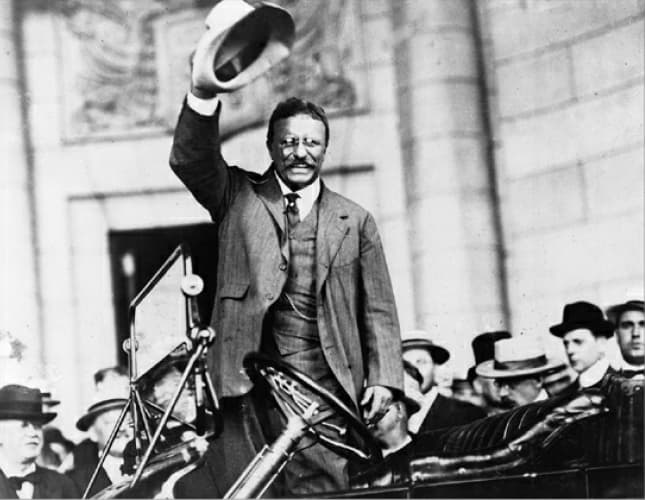For Both Presidents Roosevelt, Making History Began at Home
These two books show the biographies of great men and their mothers and sisters and wives coalescing into the courage and perseverance that is demonstrated in everyday family life, far from fields of battle.

‘The Loves of Theodore Roosevelt: The Women Who Created a President’
Edward O’Keefe
Simon & Schuster, 464 pages
‘Passionate Mothers, Powerful Sons: The Lives of Jennie Jerome Churchill and Sara Delano Roosevelt’
By Charlotte Gray
Simon & Schuster, 432 pages
Both of these biographies chip away at the self-made man mythos. Edward O’Keefe begins with Theodore Roosevelt’s claim that his life depended on his own will. “It was true, but it also wasn’t,” the biographer begins — having it both ways, as TR did as well.
History and biography converge in Charlotte Gray’s characterization of two great mothers of two great men: “The examples of resilience, acumen, and loyalty that Jennie and Sara set, the initiatives they took, the impressive support that they provided, and the networks they built, helped mold their sons’ characters and careers. Winston Churchill and Franklin Roosevelt adored their mothers and described them as central figures in their lives. The high-level friendship that would develop between the two statesmen reflected patterns of behavior they had learned as children.”
One word, resilience, repeatedly courses through these two biographies, bonding them together along with the lives they depict. “Theodore Roosevelt’s life is frequently held up as an example of resilience and willful determination, sui generis, and well-nigh supernatural. I do like and admire that picture of TR, but it is mistaken,” Mr. O’Keefe concludes.
Theodore Roosevelt’s older sister, Bamie, in a harness during her early years because of a spinal defect, stood her ground, enduring “patiently, even stoically,” her painful condition. Like all the Roosevelts, TR learned the family’s “greatest strength: resilience” from their mother, Mittie. When TR lost her, his father, his first wife, Alice, and then his brother Elliott, he wrote to an old friend, Patty Selmes, whose husband had died of cancer: “You have had a hard life, but you have faced it nobly and undauntedly; and there is something in that when all is said and done.” As Mr. O’Keefe puts it, “Roosevelt knew loss and resilience.”
No longer a beautiful young woman, Jennie Jerome Churchill, in her 60s, refused to be “defeated by setbacks—the resilience that had kept her going after Lord Randolph’s death—resurfaced.” In 1921, when her son’s career seemed over, Jennie “impulse-shopped around Rome” and kept “assuring her friend of her son’s political resilience”: “Winston’s shoulders are broad enough to bear any burden.” Everything he did “was right.” Jennie’s’ joie de vivre had become part of Churchill’s “inheritance,” just as much as Sara’s strong will had instated in her son an “incredible self-assurance and equanimity.”
These two books show the biographies of great men and their mothers and sisters and wives coalescing into the courage and perseverance that is demonstrated in everyday family life, far from fields of battle and the hustings. In TR’s case, his sister Conie, his confidante, did more than buoy him and serve as an “emotional outlet.” She served as his press secretary before the job was named as such, and became a behind-the-scenes adviser even as she was boosting him to the press. TR’s second wife, Edith, pioneered the public role of first lady that is taken for granted today.
Many families of the unfamous, of course, also have their sense of a destiny working through generations, so that the famous like the Churchills and the Roosevelts embody more than themselves, acting out the resilience in lives that are not renowned.
What Simone de Beauvoir called the second sex — hampered by societies that restricted opportunities for women and sought to shelter them from a threatening world — produced, nonetheless, a vision of fortitude and greatness in sons that were their mothers’ surrogates. In that sense, both biographies deal with women of unconstrained ambition.
Both Jennie Jerome Churchill and Sara Delano Roosevelt, born into privilege — the former a social and political operator, and the latter, more like the behind-the-scenes trainer of a thoroughbred — went well beyond the advantages of their class, to imbue in their sons a sense of the world they could dominate.
All these women became, in effect, part of the political, organizing capacity of men who only seemed, to use Mr. O’Keefe’s word, “autochthonous.”
Mr Rollyson’s work in progress is “Making the American Presidency: How Biographers Shape History.”

